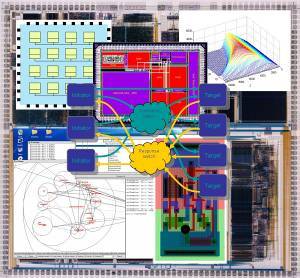
Neural systems engineering
Steve Furber and Steve Temple
Abstract
The quest to build an electronic computer based on the operational principles of biological brains has attracted attention over many years. The hope is that, by emulating the brain, it will be possible to capture some of its capabilities and thereby bridge the very large gulf that separates mankind from machines. At present, however, knowledge about the operational principles of the brain is far from complete, so attempts at emulation must employ a great deal of assumption and guesswork to fill the gaps in the experimental evidence. The sheer scale and complexity of the human brain still defies attempts to model it in its entirety at the neuronal level, but Moore's Law is closing this gap and machines with the potential to emulate the brain (so far as we can estimate the computing power required) are no more than a decade or so away. Do computer engineers have something to contribute, alongside neuroscientists, psychologists, mathematicians and others, to the understanding of brain and mind, which remains as one of the great frontiers of science?

